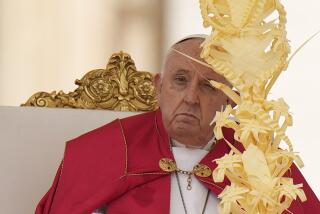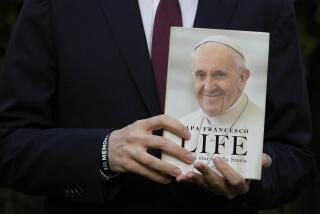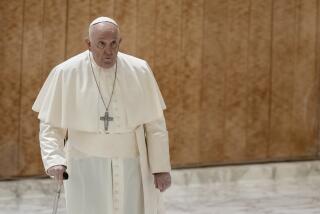John Paul’s Condition Stabilizes, but He Will Remain Hospitalized
ROME — As Catholics the world over offered prayers for his recovery, Pope John Paul II spent a second night in the hospital Wednesday and the Vatican said he would remain there for several days.
The 84-year-old pontiff was rushed to a Rome hospital late Tuesday with flu- related breathing difficulties. His condition stabilized Wednesday and his breathing, heart rate and other vital signs were “within normal range,” Vatican spokesman Joaquin Navarro-Valls said.
John Paul still had a mild fever, Navarro-Valls said. The pope needed assistance breathing when he was admitted, the spokesman said, but by Wednesday afternoon, there had been no recurrence of the throat spasms that had worried his doctors.
“Today there is no cause for alarm,” Navarro-Valls told hundreds of journalists at Gemelli Polyclinic hospital.
John Paul rested for several hours in the 10th-floor papal suite Tuesday, he said, and on Wednesday had coffee and a bit of breakfast and said Mass with his secretary, Archbishop Stanislaw Dziwisz.
The pope has been diagnosed with acute laryngeal tracheitis, an inflammation of the trachea that can block breathing.
Possible treatment includes a tracheotomy, in which a tube is inserted through the neck to ease respiration.
Navarro-Valls denied that the pope had undergone a tracheotomy or lost consciousness. He said the pontiff would remain hospitalized for a few days while he recovered.
The pope has several ailments, including Parkinson’s disease and acute arthritis, that can make a simple flu cause for concern.
Flu symptoms can be exacerbated by Parkinson’s, said Dr. Jeff Bronstein of UCLA. Patients with the disease may have difficulty breathing because they have weakened chest muscles, their muscle responses are slower, their stooped posture compresses their lungs, and decreased lung capacity makes taking deep breaths and clearing a lung infection difficult.
Such patients are at greater risk of contracting pneumonia.
Patients with advanced Parkinson’s also have difficulty swallowing, Bronstein said, increasing the likelihood that they could aspirate food or saliva into the lungs, either of which raises the risk of pneumonia.
Laryngeal spasms, sharp contractions of the throat that make breathing difficult, are not uncommon with the flu, but can be exacerbated by Parkinson’s because the trachea is already stiff, said Dr. Giselle Petzinger, a neurologist at USC.
Roman Catholic Church officials and other leaders sought to allay worry over the pope’s condition. The Italian health minister, Girolamo Sirchia, emerged from the hospital to report that doctors were optimistic about the pontiff’s recovery. And a Polish priest, Konrad Hejmo, said he had visited the pope and found him in good spirits.
“He didn’t want to come here,” Hejmo told reporters outside the hospital. “He protested for a long time, but the doctors insisted.”
John Paul, who became pope in 1978, is the third longest serving pontiff. Some Catholics, uneasy at the sight of his frailty, have suggested he might resign. The pope has repeatedly said he will not step down and that his fate is in God’s hands. He sees his very public illness and suffering as part of his mission and message, a way to convey the importance of perseverance in the face of malady.
At the same time, John Paul has mentioned death more frequently in recent months.
“We must get used to thinking with confidence about the mystery of death,” he told followers last week in his message for Lent. “Help those who are getting old with loving sympathy.”
*
Wilkinson reported from Rome and Maugh from Los Angeles.
More to Read
Sign up for Essential California
The most important California stories and recommendations in your inbox every morning.
You may occasionally receive promotional content from the Los Angeles Times.











